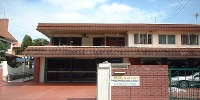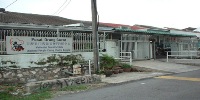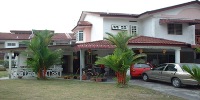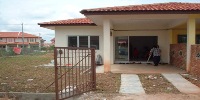35歲圓“讀書”夢
(吉隆坡)他從小到大的夢想是進入學校唸書,這個一般人眼中可輕易達成的事,他卻要在35歲之后才能完成!
發高燒患小兒痳痺症
因為他出世3個月時發了一場高燒,患上小兒痳痺症,家中長輩覺得這是一件羞恥的事,怕太多人知道,於是不讓他上學。
所以他小時候看到弟弟妹妹們去上學時,心里很羨慕,立志要去學校唸書。
直到35歲左右,他終於有機進入小學了,不過並不是做學生,而是當圖書館管理員。
他是張楨健,如果不是小時候他向弟弟“請教”,自己肯用心摸索,現在他可能會是文盲。
能閱讀簡單華文書籍
來自哥打白沙羅的楨健說,他現在能閱讀簡單的華文書籍和掌握普通的馬來文和英文詞匯,這是他這些年來努力自修的成果。
他說,他很喜歡目前的工作,這份工作圓了他想進學校唸書的夢想。
楨健目前在甲洞二校任職圖書館管理員。他感謝校方和學生在工作上給以的協助,並希望能長久在此工作。
楨健的情況是,左手和右腳可以活動,但是右手和左腳無力。
婆婆勸媽媽放棄
楨建險成棄嬰
提起往事,楨健相當感慨。他說,這事令他自小就不喜歡婆婆。
“媽媽告訴我,當我被證實患上小兒痳痺症後,婆婆曾勸媽媽放棄我,把我留在醫院,不要帶回家。”
“可是媽媽沒有狠下心腸,她告訴婆婆,我始終是她的骨肉,她不能就此拋棄我。”
他說,當時父親需到外工作,而母親是割膠工人,清晨就需到膠園工作,婆婆因為他是殘障兒,而聲明不照顧他。
從沒埋怨過父母
楨健說,因為父母的堅持,他才不至於成為孤兒。所以他從沒埋怨過父母,不過卻無法原諒婆婆,自小就很少和婆婆講話。”
除了險成棄嬰之事,另一件影響楨健至今,造成最大傷害的事是沒有讓楨健上學。
“因為我姐姐也患小兒痳痺症,她是在出世4個月大時得此病,不過她的情況好一些,她還可以走路。婆婆說,家里已經有一人殘障,上學時被人指指點點,不想我再去上學再讓人嘲弄。”
楨健說,家里除了他和姐姐殘障之外,其他弟妹都健全。
弟弟教導及自修
楨健能識字閱讀
“我15歲那年,弟弟開始唸小學,他第一天上學時,我看到他的校服很漂亮,心里很羨慕,很希望自己有機會穿上。”
“那天我等到弟弟放學回來,我向他借校服穿上,以滿足自己,但是我非常清楚一切都是假象。”
“我每天等弟弟回來,要他教我唸書認字,我是在這樣環境下長大和慢慢識字。”
楨健說,除了通過弟弟的教導,他的識字能力是通過電視節目逐慚一點點累積。
他說,他現在能夠識字和閱讀,但是書寫的能力還很弱。
他說,那時他都是看華文書,所以他不會馬來文和英文,另外,他也只是學會認字,可是完全不會寫。
華文能力只有中學程度
楨健說,現在他的華文能力只到中學程度,文字較深的書籍,他看不懂。
“初在圖書館任職,當閱讀中學程度書本時,我一行文字中有好多字不會,經過3年的努力自修,一行文字我已經可以讀出來,只是迅速比較慢。”
圖書館的工作讓楨健有更多機會與書為伍,彌補自小無法唸書的遺憾,也滿足他的求知慾。
從本身事件中,楨健體會到殘障人更需要學習機會,同時也希望社會人士多給殘障人士工作機會。他相信只要有機會,殘障人會比正常人更珍惜學習和工作的機會。
最喜歡歷史書籍
盼考取證書文憑
楨健說,他是在11年前才從家鄉來吉隆坡尋找工作,那時他是想到父母已老,有朝一日他要自己獨立生活,為了自己未來著想,他才只身出外找工作。
這些年來,他做過幾份工,包括在電子廠工作和在報社發行部工作。
楨健說,在來甲洞二校工作之前,他也在八打靈再也培才小學擔任過圖書館管理員,只是那裡的圖書館在樓上,他行動不便,所以只做18個月就離職。
“當初聽說可以在圖書館工作時,我好開心,因為終於可以完成進入校園的夢想了。”
楨健最喜歡閱讀歷史書籍,他希望可以在這方面考取一張證書或文憑。
“可是我不知道如何去尋找這方面的資料。”
他希望有人可以提供這方面的資料。
楨健已婚,妻子是名教師,倆人是在美門殘障中心認識。妻子也是他的老師,他閱讀時遇到難題,就會向妻子請教。
真情人物
姓名:張楨健
年齡:39歲
家境:已婚。
遭遇:小時因一場高燒而患上小兒痳痺症,長輩們覺得是件羞恥的事,不讓他上學,導致他沒有機會上學唸書,只靠弟弟教導及自修。他卅多歲成為小學圖書館管理員,完成進入校園的夢想。 (星洲日報/大都會‧2007.05.14)
摘自:http://www.sinchew-i.com/article.phtml?artid=200705140368&data=scnews&spid=34715
Tuesday, May 15, 2007
Sunday, May 13, 2007
Using the law to help the disabled
RAMPS have been put up for the disabled in major shopping complexes, but some are too narrow to accommodate a wheelchair.
If you take TV programmes, only news segments are being sign-translated for the deaf, while tactile flooring to help guide the blind to safety is only provided on selected urban streets.
In short, the disabled are still made to be largely dependent on others to survive, let alone lead a "normal" life.
"Without (proper) facilities, getting out of the house is not only unfriendly but downright dangerous for the disabled," said Anthony Thanasayan, spokesperson for the Malaysians Against the Discrimination of the Disabled.
He admitted there have been more efforts in recent years to have disabled-friendly facilities, "but they’ve been largely sporadic and centred in Kuala Lumpur".
"A comprehensive plan is needed to provide facilities to help us be independent and productive members of the community."
Meanwhile, parents like Darshini Ganeson are worried that their children cannot get the proper training to become independent individuals because of the lack of "well-run" vocational institutions for the disabled.
She dismisses the special public schools for the disabled, saying they are of no help.
"If I had left Nanthini in her public school, she’d be a vegetable by now. They lump the children together — the autistic with the Down’s syndrome and the dyspraxic, like my girl.
"They must realise that each has different learning capabilities," said Darshini.
Malaysia has long been a signatory of the Convention on the Rights of the Child (CRC) — the most widely ratified human rights treaty in history.
Its article 23 upholds that children with disabilities be guaranteed "a full and decent life, in conditions which ensure dignity, promote self-reliance and facilitate the child’s active participation".
Earlier this year, a new treaty to ensure the human rights of people with disabilities opened for signature at the United Nations General Assembly.
The new treaty, which strengthens CRC’s Article 23, further advocates the human rights of an estimated 650 million disabled people in the world.
As of March 30, some 80 countries have signed the new Convention on the Rights of Persons with Disabilities.
Malaysia is not on the list of signatories but the Women, Family and Community Development Minister Datuk Seri Shahrizat Abdul Jalil said "we are working towards it".
"We want to have our groundwork in place first. Our legal advisers are working 24/7 to finalise the Persons with Disabilities Bill to be tabled in Parliament this year. Once we have that in place, we will sign the convention."
Presently, Malaysia has 170,000 registered disabled people. To facilitate the disabled, especially the poor, a new directive was issued last month for special counters for the disabled to be set up in every district welfare office.
"Just go and speak to my officers and they will help you," said Shahrizat.
Source : http://www.nst.com.my/Current_News/NST/Sunday/Focus/20070513085558/Article/index_html
If you take TV programmes, only news segments are being sign-translated for the deaf, while tactile flooring to help guide the blind to safety is only provided on selected urban streets.
In short, the disabled are still made to be largely dependent on others to survive, let alone lead a "normal" life.
"Without (proper) facilities, getting out of the house is not only unfriendly but downright dangerous for the disabled," said Anthony Thanasayan, spokesperson for the Malaysians Against the Discrimination of the Disabled.
He admitted there have been more efforts in recent years to have disabled-friendly facilities, "but they’ve been largely sporadic and centred in Kuala Lumpur".
"A comprehensive plan is needed to provide facilities to help us be independent and productive members of the community."
Meanwhile, parents like Darshini Ganeson are worried that their children cannot get the proper training to become independent individuals because of the lack of "well-run" vocational institutions for the disabled.
She dismisses the special public schools for the disabled, saying they are of no help.
"If I had left Nanthini in her public school, she’d be a vegetable by now. They lump the children together — the autistic with the Down’s syndrome and the dyspraxic, like my girl.
"They must realise that each has different learning capabilities," said Darshini.
Malaysia has long been a signatory of the Convention on the Rights of the Child (CRC) — the most widely ratified human rights treaty in history.
Its article 23 upholds that children with disabilities be guaranteed "a full and decent life, in conditions which ensure dignity, promote self-reliance and facilitate the child’s active participation".
Earlier this year, a new treaty to ensure the human rights of people with disabilities opened for signature at the United Nations General Assembly.
The new treaty, which strengthens CRC’s Article 23, further advocates the human rights of an estimated 650 million disabled people in the world.
As of March 30, some 80 countries have signed the new Convention on the Rights of Persons with Disabilities.
Malaysia is not on the list of signatories but the Women, Family and Community Development Minister Datuk Seri Shahrizat Abdul Jalil said "we are working towards it".
"We want to have our groundwork in place first. Our legal advisers are working 24/7 to finalise the Persons with Disabilities Bill to be tabled in Parliament this year. Once we have that in place, we will sign the convention."
Presently, Malaysia has 170,000 registered disabled people. To facilitate the disabled, especially the poor, a new directive was issued last month for special counters for the disabled to be set up in every district welfare office.
"Just go and speak to my officers and they will help you," said Shahrizat.
Source : http://www.nst.com.my/Current_News/NST/Sunday/Focus/20070513085558/Article/index_html
Mum’s love knows no bounds
By LEE YUK PENG
PETALING JAYA: Love is not ever feeling sorry.
Life had given Tey Hong Eng, 66, and daughter Sia Siew Chin, 41, more downs than ups, but for every heartache, headache and backache they suffer, they always see a sunbeam shining through.
And being wheelchair-bound has not stopped the two gutsy women from continuing to inspire and motivate others about seeing the best in people.

Great inspirations: Tey and Sia with little Pui Yarn.
For years, Tey worked as a domestic help and, when she returned home, would bring piles of clothes to wash to earn some extra income.
In between chores, she would cook for her seven children, prepare them for school and attend to their every need.
More challenging for her was that five of her children suffer from muscular dystrophy - a disorder characterised by degenerating or abnormal muscle development.
In 1999, when she was with Sia, who was having a difficult delivery in Kuala Lumpur, they heard that a fire had gutted their wooden home in Sungai Rambai, Malacca.
In that same year, Tey was diagnosed with a spinal problem and needed to go for an operation.
Despite being wheelchair bound since her surgery in 2000, Tey said she has a better life now.
Sia, who inherited her mother’s guts and courageous nature, beamed as she talked about her only daughter – for whom she risked her life to give birth.
Due to her muscular dystrophy, doctors advised her to get an abortion. She, however, took the risk and baby Ng Pui Yarn was born.
“Pui Yarn is a God-sent gift. I have no right to take her life away,” said Sia, who was fully aware that the child had a 50% risk of inheriting the genetic problem from her.
Now, Pui Yarn has been diagnosed to have similar signs like her.
“Being a mother has made me feel complete and proud,” said Sia, who now champions the cause of the disabled as executive director of the Beautiful Gate Foundation for the Disabled.
Sia will be receiving a special Mother’s Day award from the Kiwanis Club of Taman Tun Dr Ismail here on May 20.
Pui Yarn, who grew up with many disabled around her, used to tell Sia: “I hate to be like you.”
However, Sia has repeatedly told her young daughter that being wheelchair-bound would not make her life unhappy. “You can still do a lot of things” she told Pui Yarn.
The young girl, inspired and motivated by her mum, made a Mother’s Day card for Sia, complete with a drawing of a woman in a wheelchair
Source : http://thestar.com.my/news/story.asp?file=/2007/5/13/nation/17704988&sec=nation
PETALING JAYA: Love is not ever feeling sorry.
Life had given Tey Hong Eng, 66, and daughter Sia Siew Chin, 41, more downs than ups, but for every heartache, headache and backache they suffer, they always see a sunbeam shining through.
And being wheelchair-bound has not stopped the two gutsy women from continuing to inspire and motivate others about seeing the best in people.

Great inspirations: Tey and Sia with little Pui Yarn.
For years, Tey worked as a domestic help and, when she returned home, would bring piles of clothes to wash to earn some extra income.
In between chores, she would cook for her seven children, prepare them for school and attend to their every need.
More challenging for her was that five of her children suffer from muscular dystrophy - a disorder characterised by degenerating or abnormal muscle development.
In 1999, when she was with Sia, who was having a difficult delivery in Kuala Lumpur, they heard that a fire had gutted their wooden home in Sungai Rambai, Malacca.
In that same year, Tey was diagnosed with a spinal problem and needed to go for an operation.
Despite being wheelchair bound since her surgery in 2000, Tey said she has a better life now.
Sia, who inherited her mother’s guts and courageous nature, beamed as she talked about her only daughter – for whom she risked her life to give birth.
Due to her muscular dystrophy, doctors advised her to get an abortion. She, however, took the risk and baby Ng Pui Yarn was born.
“Pui Yarn is a God-sent gift. I have no right to take her life away,” said Sia, who was fully aware that the child had a 50% risk of inheriting the genetic problem from her.
Now, Pui Yarn has been diagnosed to have similar signs like her.
“Being a mother has made me feel complete and proud,” said Sia, who now champions the cause of the disabled as executive director of the Beautiful Gate Foundation for the Disabled.
Sia will be receiving a special Mother’s Day award from the Kiwanis Club of Taman Tun Dr Ismail here on May 20.
Pui Yarn, who grew up with many disabled around her, used to tell Sia: “I hate to be like you.”
However, Sia has repeatedly told her young daughter that being wheelchair-bound would not make her life unhappy. “You can still do a lot of things” she told Pui Yarn.
The young girl, inspired and motivated by her mum, made a Mother’s Day card for Sia, complete with a drawing of a woman in a wheelchair
Source : http://thestar.com.my/news/story.asp?file=/2007/5/13/nation/17704988&sec=nation
Sunday, May 6, 2007
阳光天使生活营 2007.留言版
Tan Lee Teng
很快的又来到Sem Break,我回到家,哥哥约我来参加这个营会。本来想在家休息,妈妈却说难得有这个机会,不如就去看看吧!
起初我看到残障人士有点怕,不知道要怎样跟他们沟通,可是在与他们接触的三天里头,我已经不再怕他们了。他们让我体会到他们比我们健全的人来得更坚强、开朗和勇气。从今以后,我会好好地珍惜现在所拥有的一切,要用真心去对待每一位人。
Jade
要好好向残障朋友们学习,不要随便放弃,要努力、积极、乐观及勇敢!!!Nothing is impossible.
陈宏灏
恭喜你勇敢地冒了这次险,成功突破了你自己,踏出你的舒适区,再次把自己奉献给需要帮助的残障朋友。你也通过这两天半的活动,从残障朋友身上,学到生活的意志力,坚强的生命力,和无条件的真爱。
郭惠祥
一个人走在黑暗中是孤独?或是害怕?是悲伤?或是放弃?阳光是世界的灯,照亮世人的心,就像天使的拥抱,付出我们的爱心,永恒的爱心,让爱创造这新的世界。哭着来世界,微笑面对人生。
刘晶玫
体验,需要投入一股真诚的心,才能领悟当中的感受。所以凡事投入,就能有所得。
卢建兵
开心、感动、每一滴泪,每一滴汗,都是值得去做,去付出的!无怨无悔!感谢万莉,让我临时帮忙这营会,不然我也不知道这个营会的意义那么大,如果可以,我还是会再参加的 =)
张秀琴
感谢!感谢!常怀感恩的心才能学会珍惜身边的一切一切。谦卑才能学到更多;行动、用心才能体会人生,产生智慧。
淑芳
加油!加油!坚持下去,你可以做到的!不可能是想出来的,可能是做出来的!
很快的又来到Sem Break,我回到家,哥哥约我来参加这个营会。本来想在家休息,妈妈却说难得有这个机会,不如就去看看吧!
起初我看到残障人士有点怕,不知道要怎样跟他们沟通,可是在与他们接触的三天里头,我已经不再怕他们了。他们让我体会到他们比我们健全的人来得更坚强、开朗和勇气。从今以后,我会好好地珍惜现在所拥有的一切,要用真心去对待每一位人。
Jade
要好好向残障朋友们学习,不要随便放弃,要努力、积极、乐观及勇敢!!!Nothing is impossible.
陈宏灏
恭喜你勇敢地冒了这次险,成功突破了你自己,踏出你的舒适区,再次把自己奉献给需要帮助的残障朋友。你也通过这两天半的活动,从残障朋友身上,学到生活的意志力,坚强的生命力,和无条件的真爱。
郭惠祥
一个人走在黑暗中是孤独?或是害怕?是悲伤?或是放弃?阳光是世界的灯,照亮世人的心,就像天使的拥抱,付出我们的爱心,永恒的爱心,让爱创造这新的世界。哭着来世界,微笑面对人生。
刘晶玫
体验,需要投入一股真诚的心,才能领悟当中的感受。所以凡事投入,就能有所得。
卢建兵
开心、感动、每一滴泪,每一滴汗,都是值得去做,去付出的!无怨无悔!感谢万莉,让我临时帮忙这营会,不然我也不知道这个营会的意义那么大,如果可以,我还是会再参加的 =)
张秀琴
感谢!感谢!常怀感恩的心才能学会珍惜身边的一切一切。谦卑才能学到更多;行动、用心才能体会人生,产生智慧。
淑芳
加油!加油!坚持下去,你可以做到的!不可能是想出来的,可能是做出来的!
阳光天使生活营 2007 (一)
隐形的翅膀
每一个人,都有一颗恻隐之心,愿意为别人付出真爱。但是,我们却因为生活的忙碌,而听不见这颗心在跳动。
每一个人,都有一双隐形的翅膀,愿意为身边的人,展翅翱翔。但是,我们却因为世俗的诱惑,而将这双翅膀收了起来。
这个时候,我们应该勇敢地站出来,不再为生活的忙碌、世俗的诱惑而失去了原来所拥有的殷红。
每一个人,都有一颗恻隐之心,愿意为别人付出真爱。但是,我们却因为生活的忙碌,而听不见这颗心在跳动。
每一个人,都有一双隐形的翅膀,愿意为身边的人,展翅翱翔。但是,我们却因为世俗的诱惑,而将这双翅膀收了起来。
这个时候,我们应该勇敢地站出来,不再为生活的忙碌、世俗的诱惑而失去了原来所拥有的殷红。
Friday, May 4, 2007
殘障人搭巴士無障礙
RapidKL推介百輛‧6月上路
(吉隆坡訊)rapidKL週四(5月3日)正式推介100輛設有殘障人設施的新款巴士,並宣佈有關巴士將從6月1日起川行在直透路線和主幹路線,以及將提供訓練有素的司機來協助殘障及弱勢人士上下巴士。
在100輛新款巴士當中,其中63輛將川行在主幹路線、10輛將行駛在直透路線,剩下的27輛將胥視情況的需求提供服務。
有關巴士並非專為殘障人設計,也包括其他長者、婦孺、弱勢人士,以及一般的民眾等。
rapidKL首席營運執行員莫哈末阿里週四早上在孟沙輕快鐵站的推介禮上宣佈,目前有關巴士川行的路線仍在商討階段,將在6月1日才公佈。
他說,一旦新款巴士開跑之後,首個步驟是確保使用輪椅的乘客可以上下巴士;任何有智能和肢體殘障的搭客,將由受過特殊的訓練的司機協助上下巴士。
他說,該公司目前共聘有2000名司機,不過並不是所有司機都將受訓來協助殘障和弱勢人士乘搭新款巴士,目前的計劃是先遴選出部份司機接受特殊訓練。
他表示,該公司沒有意願開放讓殘障和弱勢人士免費試搭一段時期,因為他們目前已享有特別的優惠。“rapidKL是首間落實公共巴士無障礙的公司,並且將確保所有搭客的安全受到保障。”
哈末阿里:研究策略性路線載殘障人
莫哈末阿里說,這種新款巴士無法行駛在吉隆坡2500個巴士車站,因為有部份地方的道路結構仍未臻完善。
儘管rapidKL目前已在大約4000平方公里的範圍內提供載客服務,不過,他指出,有關範圍實在是太大,因此該公司將研究一些較多殘障人乘搭的策略性路線,並擬定時間表來提供載送服務。
出席者包括婦女、家庭及社會發展部政務次長拿汀巴杜卡周美芬、吉隆坡綜合交通網絡公司高級公關經理周庭亦、由16個殘障團體組成的無障礙環境及容易使用公共交通工具服務協會(BEAT)協調員李秋菊、美門殘障關懷中心總幹事謝秀貞等。主辦單位邀請所有出席的殘障人士前往觀看與試用有關新款巴士。
周美芬:巴士應增播音功能
周美芬建議該公司為新款巴士增設播放音響功能,以讓盲人可以辨識到巴士將前往的地點。
她也希望建築物繪測師、發展商與工程師今後在興建各種建築物時,能開放讓殘障團體參與,以便設計出具備殘障人設施的建築物。
謝秀貞險翻倒
在推介禮上,發生一段小插曲。話說周美芬順應某報攝影記者的要求,陪同謝秀貞示範從rapidKL推介的新款巴士的踏板登上巴士。
可能是周美芬不熟悉扶持殘障人輪椅和有關輪椅設計不太適合旁人從身後推動,在一股推力下,謝秀貞脫離了輪椅,幾乎翻倒在地面。
這時,反應敏捷的周美芬及時把謝秀貞抱住,沒令後者蒙受皮肉磨損之傷。謝秀貞還笑稱:“幸好她(周美芬)抱住我……” (星洲日報/大都會‧2007.05.03)

謝秀貞跌倒,周美芬(中間半蹲者)趕緊抱住她。

秀貞渾身無力,周美芬使力把她抱起來。

周美芬及一旁的工作人員,協助謝秀貞緩緩坐回輪椅上。

殘障和弱勢人士見證和試用rapidKL推出的新款巴士。
摘自:http://www.sinchew-i.com/article.phtml?artid=200705040973&data=scnews&spid=34715
(吉隆坡訊)rapidKL週四(5月3日)正式推介100輛設有殘障人設施的新款巴士,並宣佈有關巴士將從6月1日起川行在直透路線和主幹路線,以及將提供訓練有素的司機來協助殘障及弱勢人士上下巴士。
在100輛新款巴士當中,其中63輛將川行在主幹路線、10輛將行駛在直透路線,剩下的27輛將胥視情況的需求提供服務。
有關巴士並非專為殘障人設計,也包括其他長者、婦孺、弱勢人士,以及一般的民眾等。
rapidKL首席營運執行員莫哈末阿里週四早上在孟沙輕快鐵站的推介禮上宣佈,目前有關巴士川行的路線仍在商討階段,將在6月1日才公佈。
他說,一旦新款巴士開跑之後,首個步驟是確保使用輪椅的乘客可以上下巴士;任何有智能和肢體殘障的搭客,將由受過特殊的訓練的司機協助上下巴士。
他說,該公司目前共聘有2000名司機,不過並不是所有司機都將受訓來協助殘障和弱勢人士乘搭新款巴士,目前的計劃是先遴選出部份司機接受特殊訓練。
他表示,該公司沒有意願開放讓殘障和弱勢人士免費試搭一段時期,因為他們目前已享有特別的優惠。“rapidKL是首間落實公共巴士無障礙的公司,並且將確保所有搭客的安全受到保障。”
哈末阿里:研究策略性路線載殘障人
莫哈末阿里說,這種新款巴士無法行駛在吉隆坡2500個巴士車站,因為有部份地方的道路結構仍未臻完善。
儘管rapidKL目前已在大約4000平方公里的範圍內提供載客服務,不過,他指出,有關範圍實在是太大,因此該公司將研究一些較多殘障人乘搭的策略性路線,並擬定時間表來提供載送服務。
出席者包括婦女、家庭及社會發展部政務次長拿汀巴杜卡周美芬、吉隆坡綜合交通網絡公司高級公關經理周庭亦、由16個殘障團體組成的無障礙環境及容易使用公共交通工具服務協會(BEAT)協調員李秋菊、美門殘障關懷中心總幹事謝秀貞等。主辦單位邀請所有出席的殘障人士前往觀看與試用有關新款巴士。
周美芬:巴士應增播音功能
周美芬建議該公司為新款巴士增設播放音響功能,以讓盲人可以辨識到巴士將前往的地點。
她也希望建築物繪測師、發展商與工程師今後在興建各種建築物時,能開放讓殘障團體參與,以便設計出具備殘障人設施的建築物。
謝秀貞險翻倒
在推介禮上,發生一段小插曲。話說周美芬順應某報攝影記者的要求,陪同謝秀貞示範從rapidKL推介的新款巴士的踏板登上巴士。
可能是周美芬不熟悉扶持殘障人輪椅和有關輪椅設計不太適合旁人從身後推動,在一股推力下,謝秀貞脫離了輪椅,幾乎翻倒在地面。
這時,反應敏捷的周美芬及時把謝秀貞抱住,沒令後者蒙受皮肉磨損之傷。謝秀貞還笑稱:“幸好她(周美芬)抱住我……” (星洲日報/大都會‧2007.05.03)

謝秀貞跌倒,周美芬(中間半蹲者)趕緊抱住她。

秀貞渾身無力,周美芬使力把她抱起來。

周美芬及一旁的工作人員,協助謝秀貞緩緩坐回輪椅上。

殘障和弱勢人士見證和試用rapidKL推出的新款巴士。
摘自:http://www.sinchew-i.com/article.phtml?artid=200705040973&data=scnews&spid=34715
Thursday, May 3, 2007
障友選用甲洞站較方便
謝秀貞:多數住甲洞衛星市
(吉隆坡訊)美門殘障關懷中心總幹事謝秀貞指出,由於甲洞一帶的殘障朋友大部份是居住在甲洞衛星市,與甲洞中環電動火車有一段距離,所以他們向來會選擇前往甲洞花園的甲洞站乘搭電動火車。
當被《大都會》記者告知帝沙廣場旁的停車場共設有7個殘障人停車位時,她表示,她也無法理解何以殘障人停車位會那麼多,因為一般上,住在甲洞的殘障朋友很少是擁有車輛。
障友多半是低收入群
“殘障朋友多半是低收入群,買車對他們來說是很沉重的負擔,所以一般上手有力的殘障朋友就會駕駛電單車或使用電動輪椅,也有一些是靠父母載送他們到電動火車站搭車。”
她追述,在甲洞中環火車站開幕時,她曾經為該火車站為殘障人士提供的無障礙設施感動不已,但由於很多殘障朋友不是居住在該火車站一帶,必須走一段很遙遠的路才可以抵達,造成使用率偏低。
至於甲洞電動火車站,她認為,當殘障朋友搭電動火車從吉隆坡返回甲洞花園時,會在火車站遇上無法上樓梯橫跨過火車軌道回返甲洞花園的難題,因此被逼在月台處(收費櫃台對面)前往“友誼天橋”的高速大道,再繞道回到甲洞衛星市一帶。
不管怎樣,她依然鼓勵殘障朋友多使用甲洞中環火車站。 (星洲日報/大都會‧2007.05.02)

甲洞中環電動火車站設有美觀和新穎的有蓋停車站,可惜卻因大道車水馬龍,駕駛人士因擔心交通阻塞而寧可選擇在甲洞花園的電動火車乘搭火車。

行人天橋就建在甲洞第二中環公路下面,由於很少駕駛人士在帝沙廣場旁停放車輛,因此夜歸的獨行女子難免會擔心切身安危問題。

左邊的是帝沙廣場的底層停車場出入口,收費是每天1令吉,右邊則是電動火車站露天停車場出入口,收費則是每天2令吉,那你會選擇將車停在哪裡?雖然有人嫌2令吉太貴而停放在底層停車場,再步行到電動火車站,不過相反的,也有駕駛人士選擇將車停在露天場,再步行到廣場內的國民登記局辦理各種手續,主要是更快前往該局。
摘自:http://www.sinchew-i.com/article.phtml?artid=200705030304&data=scnews&spid=34715
(吉隆坡訊)美門殘障關懷中心總幹事謝秀貞指出,由於甲洞一帶的殘障朋友大部份是居住在甲洞衛星市,與甲洞中環電動火車有一段距離,所以他們向來會選擇前往甲洞花園的甲洞站乘搭電動火車。
當被《大都會》記者告知帝沙廣場旁的停車場共設有7個殘障人停車位時,她表示,她也無法理解何以殘障人停車位會那麼多,因為一般上,住在甲洞的殘障朋友很少是擁有車輛。
障友多半是低收入群
“殘障朋友多半是低收入群,買車對他們來說是很沉重的負擔,所以一般上手有力的殘障朋友就會駕駛電單車或使用電動輪椅,也有一些是靠父母載送他們到電動火車站搭車。”
她追述,在甲洞中環火車站開幕時,她曾經為該火車站為殘障人士提供的無障礙設施感動不已,但由於很多殘障朋友不是居住在該火車站一帶,必須走一段很遙遠的路才可以抵達,造成使用率偏低。
至於甲洞電動火車站,她認為,當殘障朋友搭電動火車從吉隆坡返回甲洞花園時,會在火車站遇上無法上樓梯橫跨過火車軌道回返甲洞花園的難題,因此被逼在月台處(收費櫃台對面)前往“友誼天橋”的高速大道,再繞道回到甲洞衛星市一帶。
不管怎樣,她依然鼓勵殘障朋友多使用甲洞中環火車站。 (星洲日報/大都會‧2007.05.02)

甲洞中環電動火車站設有美觀和新穎的有蓋停車站,可惜卻因大道車水馬龍,駕駛人士因擔心交通阻塞而寧可選擇在甲洞花園的電動火車乘搭火車。

行人天橋就建在甲洞第二中環公路下面,由於很少駕駛人士在帝沙廣場旁停放車輛,因此夜歸的獨行女子難免會擔心切身安危問題。

左邊的是帝沙廣場的底層停車場出入口,收費是每天1令吉,右邊則是電動火車站露天停車場出入口,收費則是每天2令吉,那你會選擇將車停在哪裡?雖然有人嫌2令吉太貴而停放在底層停車場,再步行到電動火車站,不過相反的,也有駕駛人士選擇將車停在露天場,再步行到廣場內的國民登記局辦理各種手續,主要是更快前往該局。
摘自:http://www.sinchew-i.com/article.phtml?artid=200705030304&data=scnews&spid=34715
Subscribe to:
Comments (Atom)





